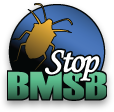Small Fruit
Integrated Pest Management for Brown Marmorated Stink Bug in Small Fruit
 This guidance document, authored by the BMSB SCRI CAP Small Fruit Commodity Team, provides a synopsis of what researchers have learned so far and management recommendations using an integrated approach. Available in English and Spanish.
This guidance document, authored by the BMSB SCRI CAP Small Fruit Commodity Team, provides a synopsis of what researchers have learned so far and management recommendations using an integrated approach. Available in English and Spanish.
Topics Include
- Basic Biology and Life Cycle of BMSB
- Small Fruit Crops at Risk / Crops Not at Risk
- Small Fruit Injury Diagnostics
- Period of Risk/Susceptibility
- Provisional Monitoring Recommendations
- Biological Control
- Provisional Management Strategies
- Effective Insecticides for Controlling BMSB on Small Fruit Crops
 Integrated Pest Management for Brown Marmorated Stink Bug in Small Fruit
Integrated Pest Management for Brown Marmorated Stink Bug in Small Fruit
 Información importante sobre frutos pequeños
Información importante sobre frutos pequeños
Extent of BMSB Problem in Small Fruit
BMSB feeds on blueberry and caneberries, damaging small fruit. Also, plant pathogens carried by BMSB may damage small fruit. A significant BMSB outbreak in 2010 presented a huge problem for small fruit growers.
Research Goals
Current research aims to monitor BMSB presence, assess damage caused by the insect, and develop effective control measures for growers of small fruit. The small fruit crop group is monitoring for BMSB in blueberries and caneberries in Maryland, New Jersey, New York, Oregon and Virginia.
Updates and Findings
As of June 2012, BMSB populations in New Jersey blueberry farms remain low.
More Resources
Researchers unveil a list of 170 plants that the brown marmorated stink bug attacks, and web videos show how to monitor for infestations.
October 16, 2012 Scientists Draw Maps to Stop Stink Bug Pirates
An integrated pest management program running since the 1980s has led to fresh insights about a new invader. Scientists are deploying maps to aid the fight.
